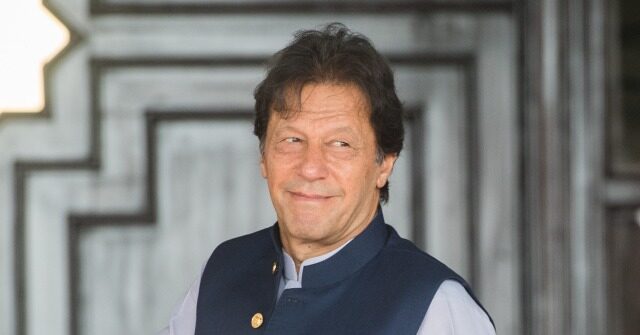Pakistan’s Supreme Court ordered the release of former Prime Minister Imran Khan on Thursday morning, two days after he was arrested in a paramilitary operation at a court in Islamabad.
Hundreds of Khan’s supporters have been arrested after violent riots swept across the country, and the Pakistani army warned it was prepared to use force against further attacks on its assets.
Khan was arrested on Tuesday by the Pak Rangers, a paramilitary police force deployed by the National Accountability Bureau (NAB), the autonomous anti-corruption agency. NAB ordered Khan’s arrest for one of the many corruption cases lodged against him. Previous attempts to arrest him for skipping court appearances on another corruption charge were thwarted by mobs of his supporters.
The chief justice of the Islamabad High Court, Aamer Farooq, was outraged by the smash-and-grab operation that whisked Khan away from his courtroom, where he was due to appear on other charges. Farooq summoned various government and security officials to explain why Khan was arrested without seeking his approval.
Khan and his Pakistan Tehreek-e-Insaf (PTI) party insisted all of the charges against him were politically motivated, and his arrest on Tuesday amounted to an extrajudicial kidnapping. Supreme Court Justice Umar Ata Bandial on Thursday ruled the arrest was illegal and directed that Khan should be released at once.
Bandial asked Khan to appeal to his supporters for calm. Khan, who told the judge he was “kidnapped from Islamabad High Court” and “hit with sticks” during his arrest, replied that he had no idea what was happening across the country after he was arrested and jailed.
The Supreme Court tribunal led by Bandial was visibly angry at the way Khan was arrested on court grounds. Khan’s lawyers argued the arrest violated numerous rules, including a requirement that the registrar must approve any courthouse arrests, and said that since Khan was seeking bail at the Islamabad High Court when he was seized, the Rangers “misbehaved” and violated his rights by interfering with legal proceedings.
“How can anyone be denied the right to justice?” Bandial said. “If an individual surrendered to the court, then what does arresting them mean? What dignity remains of the court if 90 people entered its premises?”
Bandial further charged the NAB with contempt of court for authorizing the arrest and subjecting court staffers to physical abuse by the Rangers.
Khan’s release is unquestionably a major victory for the former premier, who has been on the political comeback trail since he was booted from office with a parliamentary vote of no confidence in April 2022.
Khan’s strategy involved working up grassroots support with a mixture of Islamist rhetoric and fiery condemnation of his successor Shehbaz Sharif’s corruption and incompetence. Khan has been pushing for early elections and accusing Sharif of trying to murder or knock him out of the race with politically-motivated criminal investigations. The judicial nullification of his arrest will surely add fuel to his campaign.
Thursday’s ruling also sets up a major conflict between the judiciary and the army, which has long been one of the most powerful factions in Pakistan’s turbulent politics. The army is widely suspected to have been involved in Khan’s spectacular arrest on Tuesday because it was infuriated by his accusations that the military and intelligence services were trying to assassinate him.
The army was unusually stern in rebuking Khan for his criticisms. Army troops were deployed in several provinces on Wednesday after protesters vandalized several government and military facilities, including the home of a high-ranking general in Lahore and an army garrison in Rawalpindi. The army warned that further assaults on military or law enforcement assets would be “met with severe retaliation.”
The army directly blamed Khan’s PTI party for the violence and property damage. The far-left New York Times (NYT) newspaper noted on Thursday that Pakistan’s military has not been confronted by the public in such a direct manner in “recent memory,” including assaults on military facilities that were previously “unimaginable.”
As of Thursday, eight top PTI officials have been arrested, including party Vice President Shah Mehmood Qureshi, Secretary General Asad Umar, and top Khan adviser Fawad Chaudhry. Chaudhry was taken into custody on Wednesday after taking refuge in the Supreme Court building for 12 hours. The police warned other PTI officials to “avoid spreading rumors and incitement in public.”
“The facilitators, planners and political rioters involved in these activities have been identified and now, strict action will be taken against them. No one can be allowed to incite people and take the law into their hands,” the military’s media office stated Wednesday night.
Prime Minister Shehbaz Sharif gave a televised address on Wednesday night in which he said protesters were committing “acts of terrorism.”
“Such a spectacle has never been witnessed in the last 75 years. The people were made hostages in their vehicles, patients were taken out of the ambulances and, later, those vehicles were torched,” Sharif said.
Seven deaths and 122 injuries have been reported during the protests so far. The police said some of their officers were among the injured. PTI representatives said the police are using live ammunition on their members, sending dozens of them to hospitals with bullet wounds. Police officials denied these accusations and insisted their officers are largely unarmed.
Khan had not actually been released at the time of this writing, and it was unclear what timetable for his release the judiciary envisioned.


